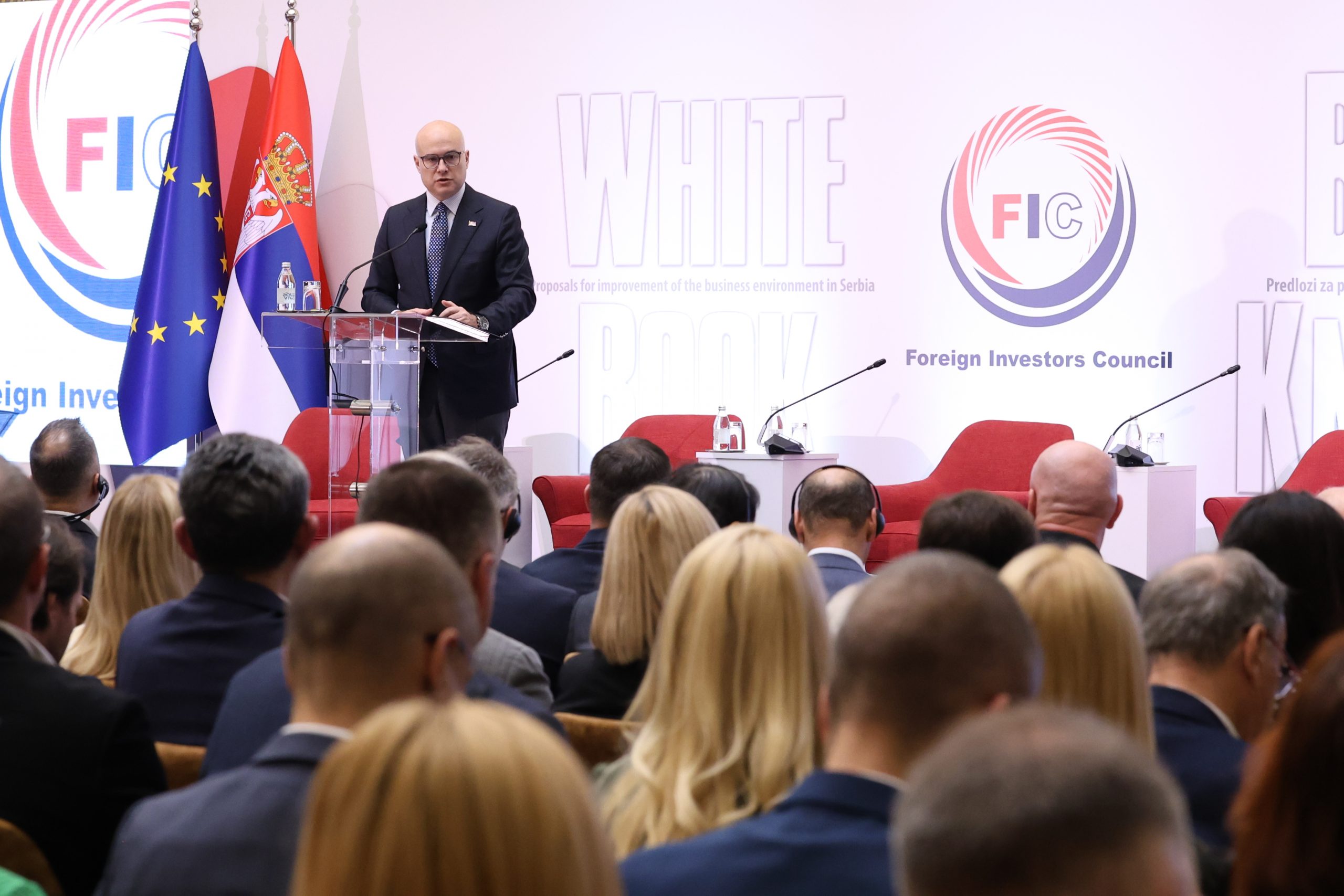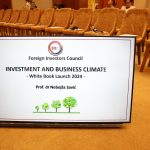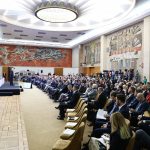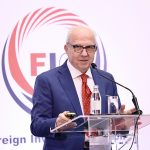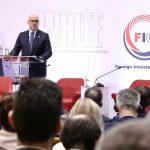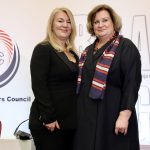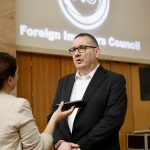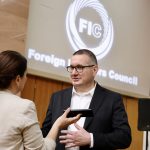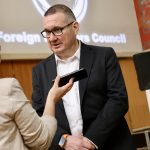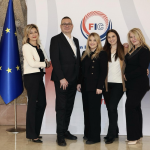Foreign Investors Council Presented the White Book 2024
Belgrade, November 15, 2024 – The Foreign Investors Council (FIC) presented the “White Book 2024” to the highest Government officials and stakeholder community. The White Book, written by FIC members, is the major product by which, for more than two decades, FIC gives recommendations to support economic growth and better living standards of Serbian citizens. The event was opened with an introductory address by FIC President and CEO of Yettel, Mr. Mike Michel, followed by insight into the “White Book” and FIC Index 2024 by the new Editor-in-Chief, Professor Nebojša Savić, PhD, as well as addresses by Head of EU Delegation in Serbia Mr. Emanuele Giaufret and Prime Minister of the Republic of Serbia, Mr. Miloš Vučević.
In his introductory speech, FIC President and Yettel CEO Mike Michel noted that despite the geopolitical crisis, especially in Europe, which has disrupted supply chains and affected the investment ecosystem, Serbia is a great place to invest, adding that the largest share of FDI comes from the EU though this share has been decreasing. “EU membership remains a priority, especially since the EU remains Serbia’s most important trading partner. That is why it is crucial to embrace the Growth Plan for the Western Balkans proposed by the European Commission. It aims to bring benefits to the region in advance of accession, boost economic growth, and accelerate much-needed socio-economic convergence and reforms,” – concluded Michel.
Speaking on enlargement, the Head of the EU Delegation to Serbia, H.E. Emanuele Giaufret, emphasized that it is no longer just a policy goal—it is a geopolitical imperative. „It is a top priority for the EU, with urgency to expand to the Western Balkans and other aspiring countries. Serbia must seize this pivotal moment and respond to the EU’s growing focus on enlargement. The time is now, with clear steps ahead. This should be at the centre of all of our work in Serbia, the Government, EU Delegation, civil society, businesses, and the entire country. To help accelerate the process, the Growth Plan for the Western Balkans offers an unprecedented opportunity for Serbia to boost its economy, bridge the socio-economic gap with the EU, and accelerate EU accession “, emphasised H.E. Ambassador Giaufret.
Having in mind all the current circumstances, the general FIC recommendations contained in the White Book 2024 refer to the biggest challenges for investments. In this sense, the intensification of negotiations with the EU on Serbia’s membership status remains a key priority in order to harmonize domestic regulations with European standards to reduce geopolitical risk for investments and foreign trade.
Traditionally, this year’s White Book includes analysis with key recommendations in areas that Council members consider priorities: taxes, labour regulations, digitalization and e-commerce, real estate and construction, combating illicit trade and inspections, environmental protection and foreign exchange operations, the pharmaceutical industry, and tourism and hospitality. The White Book Index (“FIC Index”) is a unique methodology developed by the Foreign Investors Council to measure progress in implementing the recommendations outlined in the White Book. Each area/topic is rated on a scale where 1 is the lowest score and 3 is the highest. According to this index, covering the period from November 2023 to October 2024, the overall average score for Serbia’s business climate this year stands at 1.30. Significant progress was recorded in 7% of areas, certain progress in 16% (a total of 23%), while 73% of areas showed no progress compared to the same period last year. This year’s areas with the best performance include energy, digitalization, protection of users of financial services, and public procurement. Conversely, 22 topics (areas) received a score of 1 (no progress). Among the areas without progress, food, and agriculture, taxes related to parafiscal charges, labour relations (except for the unified residence and work permit process for foreigners), tourism and hospitality, as well as insurance, leasing, and intellectual property, stand out.
In an active panel discussion on how to improve the business and investment environment in Serbia, with a special focus on transport and connectivity as one of the most urgent topics not only for foreign investors but also for the entire business community in the country, opinions were exchanged between Andrea Hochhuber, Head of European Integration and Economic Section in EU Delegation in Serbia, Marjana Davidović, Nestle General Manager for the Southern part of the Adriatic region, Nicola Pontara, World Bank, Country Manager, and Matteo Colangeli, EBRD Regional Director for Western Balkans.
During the panel, the following messages were conveyed:
‘’Regional economic integration through trade and connectivity remains a key driver of economic growth and prosperity for many countries – and especially so for small and open economies of the Western Balkans, where integration can help them pool resources to achieve economies of scale and create a more attractive business environment,’’ said Nicola Pontara, the World Bank Country Manager for Serbia. ‘’To better connect among themselves and with the European Union, the Western Balkan region needs continued concerted effort to further reduce border waiting times through a series of soft measures including implementation of technical standards and simpler border crossing procedures for a smoother flow of goods and greater economic gains.’’
Discussing the challenges of doing business in Serbia, Marjana Davidović, CEO of Nestlé Serbia, Montenegro, and North Macedonia, emphasized the need for standardizing and improving the entire foreign trade chain. She highlighted the importance of fully digitizing certificates required for goods transport to other countries, improving infrastructure and organization at border crossings, and recognizing EU-based analyses. She also stressed that “Utilizing rail transport aligns with the green agenda and CO2 reduction efforts, helps lower transportation costs, especially for large volumes of goods, and eases road transport congestion. Successful implementation of rail transport requires collaboration between government institutions and the private sector, as well as further investment in infrastructure and digitalization.”
“We are pleased to see Serbia’s continuing progress on energy transition, digitalization, and innovation which are crucial to the country’s competitiveness. These are key priorities for EBRD, as well as raising environmental standards and helping SMEs integrate in international value chains” said Matteo Colangeli, EBRD Regional Director for Western Balkans.
________________________________________________________________________________________________
In order to fully embrace the era of digitalization, but also to be environment-friendly, FIC again opted against printing the White Book publication which is available for free download on the FIC website (www.fic.org.rs).
About FIC: From an independent business association created by 14 companies, we stayed faithful to our principles and grew to gather more than 120 companies from all around the globe who have invested over EUR 45 billion and directly employ more than 116,000 people in Serbia compared to EUR 150 million of investments and 3.160 employees in 2003! FIC main goal is to influence the improvement of business climate in Serbia by making concrete reform proposals and building a business portal for communication with the authorities in Serbia. FIC is also focusing on promoting solid business ethics and high corporate governance principles within the organization and towards local companies, the Government, and other external stakeholders. Through support and active engagement of membership, FIC has proven to be a strict guardian of the business community interests and at the same time a reliable partner to the Government of Serbia and other relevant stakeholders.
Event photos:

